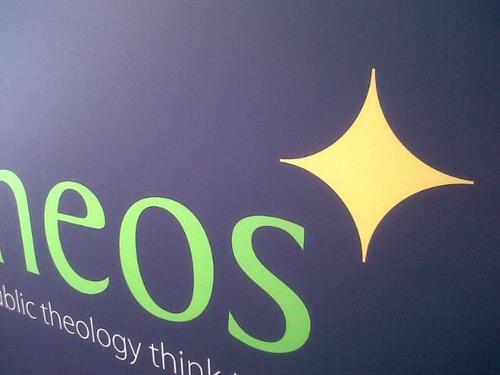THEOS
Featured Guest Blog:
The religious “think tank” THEOS is a well funded operation for promoting religion in public life.
From the THEOS web site:- What THEOS stands for:
In our post-secular age, interest in spirituality is increasing across Western culture. Faith is on the agenda of both government and the media. Our increasingly religiously diverse society demands that we grapple with religion as a significant force in public policy and our wider public life. In the arts, humanities and social sciences there are important intellectual developments currently taking place around questions of values and identity. Theos speaks into this context. We believe that it is impossible to understand the modern world without an understanding of religion. We also believe that much of the debate about the role and place of religion has been unnecessarily emotive and ill-informed. We reject the notion of any possible ‘neutral’ perspective on these issues.
The term “post-secular” was coined by Jürgen Habermas. A German academic born in 1929. Many on-line biographies of Habermas may be found. I offer the following:- https://www.britannica.com/biography/Jurgen-Habermas
Habermas thus stressed the importance for having an “ideal speech situation” in which citizens are able to raise moral and political concerns and defend them by rationality alone.
This is entirely in keeping with the ambitions of secularists and rationalists today.
Habermas seems to have used the term “post-secular” to introduce discussion on how human affairs might be guided now that religious dogma no longer determines these matters. He writes extensively on this at:-
http://www.signandsight.com/features/1714.html
A more appropriate rendering of the term “post-secular” might be “post-secularisation” so “post-secular society” should be understood as “society after secularisation has taken place”. More economically as “secular society”. I think the problem is that when we talk of a “secular society” the religious fear that this is a society without religion. What we really mean is a society which forms its laws and delivers its services without regard to a specific religious dogma. In such a society, citizens are free to practice their religion but must not expect the state to privilege their or any other religious beliefs. It is the only workable basis for a complex, modern, internationally connected state.
The important question is: What are the roots of morality and justice now that we have (in Wales) a (nearly) secular society? The attempt by THEOS to convey the impression that the process of secularisation is ended and we now inhabit in a world of “spiritual” concern, with governments and people wishing to “grapple with religion” to find the right way to live is utterly detached from reality.
The equality of women and men, universal adult suffrage, the elimination of capital punishment, universal state funded education with a national curriculum, were all achieved by struggle against the Church. The opposition to these foundations of a free society are still to be found in the fossilized remnant of Church power. The titanic struggle over the past few decades to obtain gender equality and the ending of discrimination on grounds of sexual orientation in that last bastions of Church power. .. its own Canon Law and the House of Bishops… is proof, if any were needed, of historic Church opposition to these benchmarks of Western Civilization.
Are we now in a “post-secular age” at a time when many churches are empty or have been converted to secular use? Are we moving to a world where every nation will be a theocracy? Of course not.
Both pre-Christian and post-Christian philosophers have dealt systematically with the requirements for an ethical life and a just society. Consulting the authors of Scientology, Eastern mysticism or fundamentalist Islam and Christianity is not likely to be productive.
The facts are these – the Catholic Church is in disgrace and even in the Republic of Ireland politicians are now, at last, prepared to stand up to the Cardinals. The Anglican Church is in rapid decline, most of its pews are empty and those that are not are filled with elderly folk. A University of South Wales academic (who is a Christian) is predicting extinction for the Church in Wales within a few decades.
http://churchgrowthmodelling.blogspot.co.uk/2015/07/anglican-church-decline-in-west-data.html
It is true that the retreat of the traditional religions leaves a vacuum and into this vacuum are moving some strange cults, Scientology being one of the strangest, although the even stranger beliefs of Roman Catholicism are protected by a patina of age and familiarity. But these weird cults still represent a tiny minority of citizens. Many only exist because they were set up and are maintained by the wealthy Religion Industry of the United States.
But census data reveals that more and more people are utterly uninterested in religion. Many of those have seen through the tired mythology and ritual which they were force-fed in their school days (primary school nativity plays, secondary school compulsory worship and RE) and the rest have simply found more interesting and worthwhile things to do with their lives than religious ritual and are quite happy with not being “saved”. It is more difficult for religionists to engage with lack of interest than with reasoned opposition. Creating a complex argument in Theodicy to explain away a vast natural disaster at least gives the cleric something to work with. Indifference was once combated by threats of damnation but this no longer has any effect and would be greeted with derision.
The frantic efforts of THEOS to make religion seem relevant are rather sad. Religion in the present day world is relevant mainly because of the violence of fundamentalists. Suicide bombers who kill at random and the assassins who murder those who have the courage to think for themselves. Such violence is not confined to Islamic Fundamentalism. It should be remembered that Christian religious extremists in America have murdered doctors because of dogmatic opposition to abortion.
http://www.legacy.com/ns/george-tiller-obituary/127922039
The Churches are noticed only when their cover-up of the misdeeds of clergy are at last revealed. Bishops, Archbishops and Cardinals oppose, from time to time, social progress – but almost always without effect. Two recent episodes that demonstrate this are the futile opposition of the Archbishop of Wales to organ donation by presumed consent and the futile opposition by the Archbishop of Canterbury and the Cardinal Archbishop of Westminster to mitochondrial DNA transplant.
The political class, always two steps behind the zeitgeist, continues to pay homage to religion, conservatives more so than progressives, and this can be expected to continue for a while.
Religion in Britain is more irrelevant today than at any time in history. Of course religion has an historical and sociological interest. Its political relevance lies in the traditional links between governance and religious dogma and the residual influence of the clergy. Both are waning.
An important issue involving religious dogma concerns human reproduction. It is now almost forgotten that there was dogmatic religious opposition to IVF when it first became technically feasible. One rarely hears of religious objection now, indeed one rarely hears of IVF although its use is common. A current example concerns assisted suicide. Again opposition is largely religious. One indication that even the clergy recognise the weakness of dogmatic argument is that they will attempt to object on the basis of non-dogmatic argument. Assisted suicide, they say, is un-necessary because palliative care is so effective. Assisted suicide, they say, is damaging to the morale of disabled persons. Never do they say “suicide is a mortal sin”. That argument was lost when suicide was de-criminalised decades ago, no doubt despite opposition from the Church. Former Archbishop George Carey has argued for legalising assisted suicide. He bases this upon harrowing personal experience. His isolation proves my point.
The only public service in which religion has, to a degree, turned back the tide of secularisation is school education in England. The schools policy of Tony Blair and Education Minister Ruth Kelly following the 9/11 atrocity was to create many state funded sectarian (“faith”) schools. The utterly irrational argument advanced for this was that state funded sectarian apartheid in schools would somehow stem the growth of fundamentalist Islam. The fact that both Blair and Kelly were Catholic was proved to be important when Ruth Kelly confessed on TV “if we are to have Catholic schools then we cannot refuse to provide Moslem schools”. Kelly, a member of the Catholic society Opus Dei (working for God) left politics before the 2010 General Election to work for God in the Banking Industry. She is now a Pro-Vice Chancellor at St. Mary’s Catholic University, Twickenham.
A suspicion must remain that the Blair schools policy was an attempt to pre-empt demand for the total secularisation of school education. The Blair “faith” schools policy was enthusiastically taken up by the Coalition Government and the current Tory government. They are all two steps behind the zeitgeist.
In Wales we have not suffered this reversal. We must work to make sure that it does not happen here.
Alan Rogers
Secular Wales/Cymru Seciwlar
August 2015 (updated May 2017)
Source (original): Theos | Secular Wales/Cymru Seciwlar




